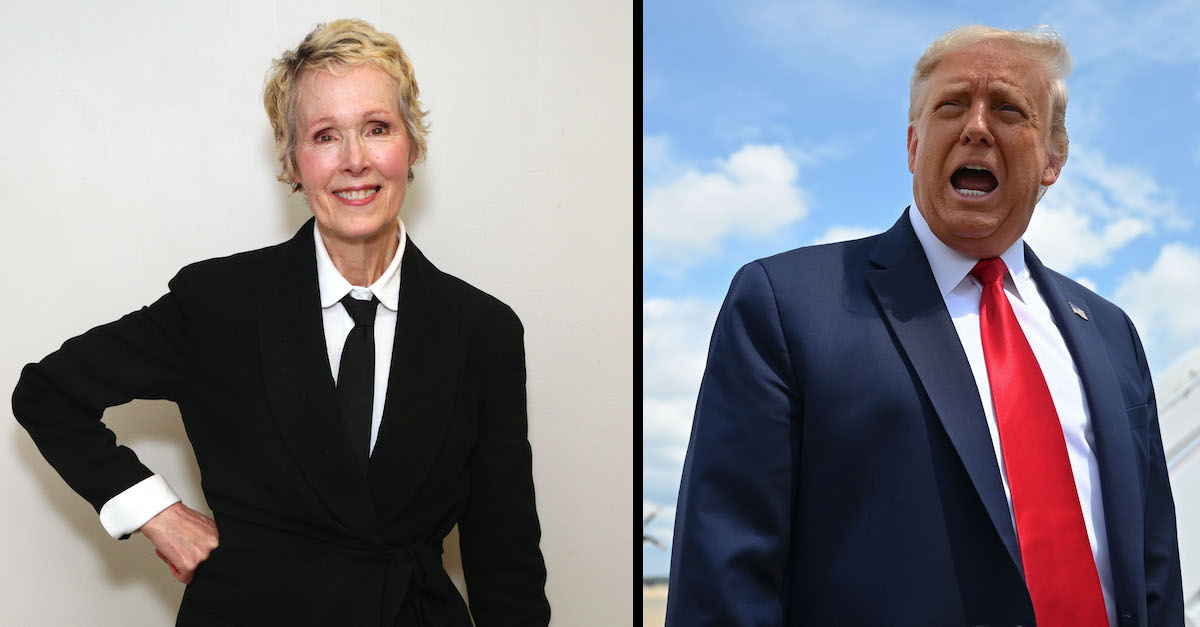
A New York State judge has granted a procedural win to E. Jean Carroll, a former Elle columnist who alleges that President Donald Trump sexually assaulted her in the 1990s in the dressing room of a department store.
Carroll sued Trump for defamation after he said he’d never met her and because he claimed she was lying about him to try to sell a book. (A picture shows Carroll together with Trump.) Trump argues in return that he should have not have to face the litigation. Among his claims is that “the Supremacy Clause of the United States Constitution prohibit[s] state court subject matter jurisdiction over a sitting United States President,” wrote Judge Verna L. Saunders in a brief recap of the president’s legal argument.
Trump attempted to argue that the Carroll case should be stayed until the courts can determine the jurisdictional issue, which is also being litigated at the state appellate court level in a similar case filed against Trump by Summer Zervos. Trump’s argument goes that the Carroll case should sit on hold until the jurisdiction issue is settled in Zervos’s case — and henceforth applied to Carroll’s case.
Carroll argued that Trump’s attorneys were merely attempting to inject another delay tactic into the proceeding.
The judge disposed of the arguments by reminding both sides that even though the Zervos case was still winding its way through the state court system, the U.S. Supreme Court decided the issue in Trump v. Vance, the litigation over a state criminal subpoena of president’s tax returns from his finance firm.
“Article II and the Supremacy Clause do not categorically preclude, or require a heightened standard for, the issuance of a state criminal subpoena to a sitting President,” Judge Saunders wrote, quoting the syllabus (but not the actual opinion from) Trump v. Vance. (The actual words of the holding are similar enough so as not to quibble too much over the precise source.)
The judge further quoted this passage from Vance after a brief discussion about the lack of ability by a state prosecutor or state court system from effecting a constitutional matter at the federal level:
Two hundred years ago, a great jurist of our Court established that no citizen, not even the President, is categorically above the common duty to produce evidence when called upon in a criminal proceeding. We reaffirm that principle today and hold that the President is neither absolutely immune from state criminal subpoenas seeking his private papers nor entitled to a heightened standard of need. The “guard[] furnished to this high officer” lies where it always has—in “the conduct of a court” applying established legal and constitutional principles to individual subpoenas in a manner that preserves both the independence of the Executive and the integrity of the criminal justice system.
“This court construes the holding in Vance applicable to all state court proceedings in which a sitting President is involved, including those involving his or her unofficial/personal conduct,” Saunders ruled. “Accordingly, the application for a state is denied.”
Carroll attorney Roberta Kaplan, a partner at Kaplan Hecker & Fink, reacted as follows:
We are very gratified that Judge Saunders, recognizing the clear holding of the Supreme Court in Vance, has rejected President Trump’s assertion of absolute immunity and has denied his motion to stay E. Jean Carroll’s case. We are now eager to move forward with discovery so that we can prove that Donald Trump defamed E Jean Carroll when he lied about her in connection with her brave decision to tell the truth about the fact that Donald Trump had sexually assaulted her.
Read the filing below:
E Jean Carroll v Donald Trump by Law&Crime on Scribd
[image of Carroll via Astrid Stawiarz/Getty Images for Glamour; image of Trump via JIM WATSON/AFP/Getty Images]